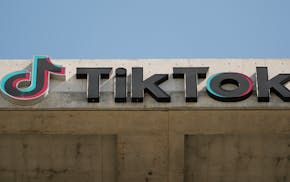The stadium plan for the Minnesota Vikings that emerged Friday put the team in a spot any football fan could identify with -- needing a touchdown with time running out and still a long way from the end zone.
With just 44 days left in this year's legislative session, the proposal's formal introduction was praised by Gov. Mark Dayton, and an array of legislators on both sides said there is still enough time to approve a stadium funding plan. "I'm optimistic," said Sen. Joe Gimse, R-Willmar.
"I'm glad the Legislature's taken that step," Dayton, a DFLer, said Friday.
The bill still has plenty of blank spots in it. No site has been picked and the bill would allow nearly a year to make such a selection.
Dayton on Friday appeared open to passing legislation by mid-May that would advance a new stadium without completing a deal. "I'm agreeable to that," he said of selecting a site by next February, "as long as they pass something that can enable this project to move forward."
The legislation has been repeatedly delayed at the Capitol amid a see-saw debate between Republicans and DFLers over how to close the state's projected $5 billion deficit. Friday's bill closely followed an outline that the plan's two GOP authors released a week ago.
Under that plan, the state would commit to as much as $300 million, largely through a series of so-called user fees that would include a pro-sports memorabilia tax, a Vikings lottery game, a sales tax on direct satellite services, plus a property tax exemption on the stadium. Three other state contributions would come from a player income tax surcharge, a state tax on luxury boxes and the sale of the stadium's naming rights -- all moves that may draw opposition from the team and the National Football League.
In an attempt to entice a local government to join the state and the Vikings as a funding partner -- none so far have -- the proposal would allow them to levy a half-cent sales tax increase, boost liquor, lodging, food and beverage, and entertainment taxes by as much 3 percent each, and charge an admission tax of up to $1 to per ticket to raise money.
The plan would commit the team, which has played in the Metrodome for 29 years, to contribute $1 for every $2 in state and local money for a new stadium; the most recent pricetag was just under $900 million.
The plan has one other notable caveat: A new stadium authority would have access to the team's audited financial records -- NFL teams have long been seen as being worth hundreds of millions of dollars -- but would agree not to disclose them to the public.
Under the plan, the Vikings would never really be able to leave Minnesota. Should the team leave after a stadium deal is signed, the plan would require the NFL to transfer the team's name, logo, colors, history, playing records and trophies to the state.
Little fanfare
Despite intense interest in the proposal, the plan was submitted with little fanfare Friday afternoon. The 24-page proposal was the second-to-last of 34 legislative bills listed by the state Senate that would be formally introduced on Monday. The bill, whose chief author was Sen. Julie Rosen, R-Fairmont, had three coauthors, Republican Sen. Doug Magnus of Slayton, and two DFLers: Sens. John Harrington of St. Paul and Linda Scheid of Brooklyn Park.
"It's very simple," Harrington said of his support. "This is a jobs bill. It's between $700 and $900 million in jobs." Noting the collapse of the Metrodome's inflatable roof in December during a snowstorm, he added, "I think it's time to get serious."
The legislation's unveiling brought forward other ideas for funding a stadium that for now remain on the sidelines. "I'm still fond of the idea of doing something with a racino-type project," said Rep. Michael Beard, R-Shakopee, referring to a plan to put slot machines at the state's horse racing tracks.
Republicans, who control both legislative chambers, have promised for months to introduce a stadium plan, only to postpone the move. After the passage of the last of the GOP-led budget bills, stadium sponsors Rosen and Rep. Morrie Lanning, R-Moorhead, said it was time "to get the stadium conversation started."
But even on Friday, Senate Majority Leader Amy Koch downplayed the Republicans' focus on the stadium plan. "Just as with any bill, the discussion comes up but we've not had caucus discussion about it," said Koch, R-Buffalo. "For the last two or three weeks, and really going back to January, [we] have all been focused on the budget."
Senate Minority Leader Tom Bakk said Republicans were simply using the stadium as a "distraction" from the GOP's attempts to dramatically reduce the size of government. "I just think they're stringing the [stadium] issue along, trying to distract the public," said Bakk, DFL-Cook. "[Republican] leadership has given no indication they're going to move [the stadium bill] yet. So what's the point of introducing it?"
Staff writer Rachel E. Stassen-Berger contributed to this article. Mike Kaszuba • 651-222-1673

Person rushed away on a stretcher after fire extinguished outside Trump hush money trial
Attorneys argue that Florida law discriminates against Chinese nationals trying to buy homes
The Latest | Person rushed away on stretcher after fire extinguished outside Trump hush money trial

